Spoken Word Reviews
TOWN - Jane & Jim Poetry Theatre
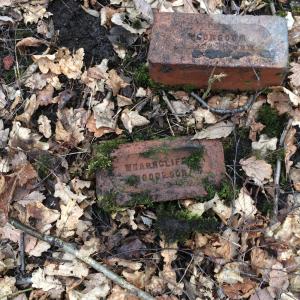
The state of modern Britain is a subject not much examined in this year’s Fringe. In the Buxton International Festival commentators and opinion leaders have necessarily opined; in the Fringe some comedians have made jokes about political leaders - a very easy target it must be said - or the Brexit process. But any attempt to get to grips with what is going on in our communities today has been largely absent.
Why this should be is not entirely obvious. Maybe there is a sense that entertainment should be about something else, or that other media cover these issues exhaustively and exhaustingly. Let’s be glad, then, that Jane & Jim Poetry Theatre - close to the end of the Fringe - made a serious attempt to show that biting social commentary could be entertaining.
Jane Steele and Jimmy Andrex combine poetry with music and sound effects. The poetry has riffs that repeat like songs or music. They draw on their experiences of living and working in Liverpool and Yorkshire towns and cities such as Wakefield and Bradford. Places that historically depended on the developments arising out of the industrial revolution for their prosperity but which are not seeing the benefits of trickle down economics to support any revival.
These are towns where some of the white, working class population are angry, bitter, disenchanted. They may have voted for Brexit because... why not? Voting in a referendum hasn’t dissolved the anger, but what can?
Town draws on the experiences of some that are marginalised and despised: carers, those with learning disabilities or reliance on benefits. Stories are told but by and large prescriptions are avoided. (Though there is a song that insists that This Land Is My Land, This Land Is Your Land, This Land Is Big Enough For Everyone - in answer to those that say ‘we’ are full-up, at tipping point).
There are problems facing many and these problems are faced too often without hope. Turning us around from a negative to a positive outlook is the challenge. Ignoring the challenge can never be the answer. We need more performances like Town and we need more performers like Jane and Jimmy.
Keith Savage
CONFLICT OF INTEREST - Mirth of Forth

Hard work, these festivals - so it took me a long time to realise comedian and punster Richard Pulsford (Uns-Pun) had slipped a second show into the Spoken Word section of Buxton Fringe. It took me even longer to spot the pun in the title. This refers to Richard’s interest in the First World War. More specifically, the show tells the story of some of Richard’s ancestors, concentrating on their wartime experiences 100 years ago. Early in the show Richard gave the story an interesting twist. His grandfather was Austrian – he was on the other side!
The story started with Richard inheriting some photo albums and family memorabilia. This prompted Richard’s research which has uncovered some fascinating stories. This research is continuing and may lead to a further show, so I’ll try to avoid any spoilers in this review. The stories spread well beyond the original area of interest and even included a link to the Titanic! Before covering the First World War events Richard gave some brief history which helped to put the stories in their historical context. The stories are covered in a logical order and there are plenty of illustrations, including old prints and contemporary views.
I found the show interesting throughout and at times extremely moving. Richard’s experience as a comedian gave the delivery a light touch using just the right amount of wry humour where it was appropriate. The tragedy and waste of warfare was there, but this was balanced by the everyday details of ordinary lives, including a bankrupt baker who went on to win the Military Cross.
This show and Uns-Pun were both one-offs on the final weekend of the festival. I enjoyed both and I hope we see more of Richard at next year’s Buxton Fringe.
Sam Slide
SIR ORFEO - Michael Gibson and Gill Page
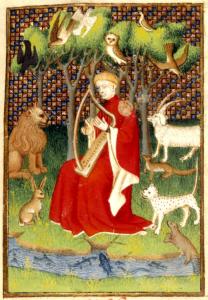
This is an intimate performance in a small setting. Eleven of us gathered at the Green Man Gallery to hear Michael Gibson bring this centuries old poem to life with accompaniment from skilled musician, Gill Page.
Prior to the performance, the audience were given a leaflet penned by the performers and this helped to set the scene, as did the wonderful introduction provided by Michael. This gave us the background and historical context with which to approach the work. He also took the time to introduce himself to members of the audience before explaining how the poem would be performed.
‘Sir Orfeo’, was written by an unknown author sometime in the early 14th Century. The origins of the story can be found in Greek mythology – Sir Orfeo is based on Orpheus who tries to bring his wife back from the underworld. In the poem the source material is influenced by Celtic mythology. Sir Orfeo also loses his wife, but instead of dying she is taken to another world - the fairy realm.
Michael has a strong engaging voice and uses this to terrific effect in his rendition of the poem. He has gone to great lengths in translating the poem for a modern audience. In doing so though, he has been careful not to lose the musicality of the piece or replace the beautiful traditional language. Accompanying Michael is Gill Page, one half of a medieval musical duo called Trouvere. She plays a replica medieval harp and has chosen four themes to accompany the verse. Despite the harp being smaller than modern day instruments the music she played helped lend the performance an otherworldly feel. The two performers complement each other perfectly.
This is an absolute gem of a show. My fellow audience members agreed with me as we descended from the performance space. In the leaflet Michael gave us, he says, “this wonderful story tells itself”. This is true, but his careful translation and the performance of both he and Gill, help this poem transcend the everyday and become an experience not to be missed. I would very much recommend that you don’t miss the second performance on Friday 20th July at 6.30pm.
April Irwin
AYRES AND GRACES: AN EVENING IN THE COMPANIE OF SAMUEL PEPYS - Mr Simpson's Little Consort
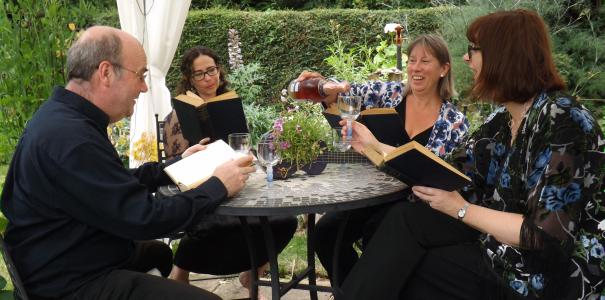
Mr Simpson’s Little Consort delighted audiences in Buxton and Eyam last Fringe and it is a great pleasure to welcome them back. They are bringing two different programmes and St Peter’s, Fairfield is a new venue for them - and the two make a good fit. The Church has a good warm acoustic and a natural ‘stage’ area which creates a good ambience for the Consort.
Samuel Pepys kept his famous (if not notorious) diaries between 1660-1669, from his mid-20s. He lived to be 70 but gave up on his diaries when just 36 (fearing, unnecessarily, that he was damaging his eyesight). Much of his diaries are about eating and drinking (too much) but Pepys also recounts the scientific discourse he enjoys about the relationship between animal teeth and diet and the nature of optics, for example. Pepys was also a keen amateur musician and was especially fond of the recorder.
Ayres and Graces is a mixture of readings from Pepys diaries (delivered with gusto and in an outrageous wig by George Higgins) and more or less contemporary music by the likes of Purcell, Dowland and anon. The music features the lovely soprano voice of Cate McKee as well as the accomplished playing of Dawn Johnston (theorbo and lute), Piers Snell (bass viol), Christine Whiffen (harpsichord), Sue Snell (viol and recorder), and Lucy Bignall (viol and recorder).
The first half of the programme was relatively light-hearted in that it dealt with the return of the monarchy with the coronation of King Charles II in 1661 and Pepys’ personal life: the problems caused by over-eating, drinking to excess and meetings with pretty whores.
The songs which were carefully chosen to match the prose action included Purcell’s The Bashful Thames and Dowland’s Come Again.
The second half of the programme was mostly given over to the events of the Plague and the Great Fire (1665/1666) and included Thomas Ravenscroft’s Remember O Thou Man, Dowland’s Come, Ye Heavy States of Night and Purcell’s Strike the Viol.
A little bawdy relief was provided by the song My Man John (My Man John had a thing that long, My maid Mary has a thing that was hairy). We were invited to believe it about mending a broom but few were persuaded. Whilst the Fringe programme issued a health warning about 17th Century swearing there was little to alarm most adults - rather there was much to admire and enjoy.
Further performances 20/21 July
Keith Savage
TWILIGHT AND DARKNESS - LJN Company
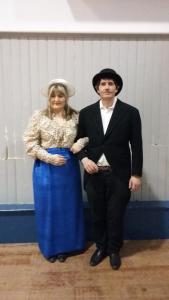
What a great value-for-money show this is with half a dozen self-penned short stories of dubious morality, ghostly goings-on and a short mystery play to finish with!
Performed by authors Jill Neves and Leslie Oldfield, this is spellbinding storytelling that keeps the listener intrigued with breathless anticipation of the next instalment.
Leslie’s delivery, entirely from memory provokes totally silent appreciation followed by rapturous and spontaneous applause upon conclusion. He tells of a carpet bag filled with cash that ensnares an unsuspecting fellow from Little Longstone into a promise that he can’t keep. Later in another tale, he recalls the vision of war provoked by the memorial statue on Buxton’s Slopes.
Jill’s vocalisations and terrific word-painting brought oppressive images of rural colonial America vividly to life when reciting from Edith Wharton’s ghost story, The Lady’s Maid’s Bell. Ghosts given the flesh of stunning word-craft.
Inspired use of surroundings as well as clever use of mime, props, accent, humour and fright-tactics really brought all spoken words about things dead and undead to a rich and colourful life.
David Carlisle
BRING A BOOK AND SHARE A STORY - Buxton Festival Fringe
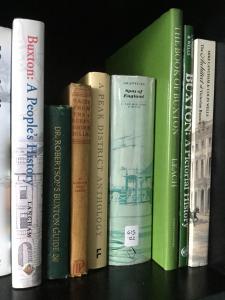
I love the fact that the entertainment on offer at the Fringe is so varied. Yesterday, after some hearty audience interaction throwing cherry tomatoes and trying not to kiss the irrepressible theatre performer Garry Starr in the jungle heat of the Old Clubhouse, I landed up at Buxton Library where Fringe volunteers (not me) had organised a sedate and reflective round table event where booklovers could talk about their favourite writers. The Buxton Library venue was chosen not just for its bookish vibe but as an opportunity to bring the Fringe out of the centre of town and closer to where people live.
Half a dozen of us read from an eclectic selection of books beginning with Jerome K Jerome’s The Idle Thoughts of An Idle Fellow including a hilarious account of “the most miserable month I ever spent” in “gouty, consumptive Buxton”. Kate Atkinson’s A God in Ruins came under scrutiny with its hard-to-like characters (the consensus was that it wasn’t as good as its predecessor Life After Life) and Rohinton Mistry’s Fine Balance was praised as a masterpiece but not an easy read. John Boyne’s The Heart’s Invisible Furies was a great choice for reading aloud with its fantastic humour evident from the very start. The Night Circus by Erin Morgenstern was another book that captivated from the opening creating a wonderful atmosphere of magic. Matt Haig’s How to Stop Time with its over 400-years-old narrator threw us into a fascinating parallel universe. For my own part, I introduced Jennifer Egan’s Manhattan Beach and a lovely passage in which a young woman contemplates the scary but stimulating freedom of starting out alone and rootless in wartime New York.
The occasion brought to mind happy memories of Fringe Readings which lost their traditional venue but which we hope may return at some point. Bring a Book is different but certainly enjoyable. It struck us all as being very sustainable with its DIY format and also something that could offer an alternative to the traditional book group. Take a break from festival fever and experience it for yourself at the next Bring a Book next Wednesday July 18th 5.30-6.30pm. I should add that the event was a wonderful advert for the library and our beleaguered library system. I noticed on leaving that several of the books we had been talking about were there on the shelves ready to be borrowed. That kind of accessibility is to be cherished.
Stephanie Billen
TAKING IT BADLY - The Glummer Twins

Ray Globe and David Harmer are the Glummer Twins and really are taking turning 60 badly! This very funny pair provide an entertaining journey on their thoughts and observations of this major milestone through spoken word, music and comedy. Reflections on acronyms of Grumpy, Kippers and Yuppies are explored along with nightclubs, aftershave, bands and discos; many members of the audience laughing and nodding knowingly!
Hilarious adlibs were reminiscent of Morecambe and Wise; the heckling from Malcolm on sound all added to the fun interspersed with some excellent timing and well-placed one-liners. The Mediterranean Homesick Blues struck quite a chord with everyone and the ‘dressing up’ session was brilliant and gave you a completely different take on stand-up.
Another musical interlude on the Old Blokes Blues demonstrated further skills with Ray on guitar. It got quite sombre with the notes on funerals although the cleverly written Streetcar named Retired revived it and finished with an innovative Ikea/West Side Story mish/mash – which was seriously clever and very funny.
Well thought through and topical expert writing really is the secret of the success of this performance. This routine is such fun and well worth a visit; such a variety of skills are used to entertain and encourage you to wallow in nostalgia of your disco dancing days. (There is also some terrible dancing but don’t let that put you off!)
It is on again at Underground at the Old Clubhouse on July 12th, 19th, and 21st at 1.00pm. A chat with Malcolm afterwards revealed that they are also off to Edinburgh Fringe and well deserved. He also confirmed their names Globe – as in spherical and Harmer as in self!
Book your ticket now, this will be popular…
Sandra J Cooper
TROUBLE AT T’ MILL - Discover Buxton/Buxton Festival Fringe

There is an idylic local walk through Millers Dale along the river Wye that passes between Litton Mill and Cressbrook Mill both of which have now been converted into luxury apartments. At Buxton library, four readers plus a musican recounted the harrowing true stories of children working in those mills during the early ninteenth century. The stories were recorded in the Ashton Chronicle in 1849 based on the testimony of two of the children (Sarah Carpenter and John Birley) who had worked there and had survived into middle age. The text was originally dramatised in Salford by Maxine Peake who gave permission for this performance.
The stories included being made to walk hundreds of miles from Bristol and London to Derbyshire, being lied to, beaten, and underfed. Often the beatings left the victim unconscious and sometimes cause their deaths soon after. The tales sometimes described kindness of strangers but also the sadism of the men and women who supervised the mills. Particularly poignant were the descriptions of the once a year tiny pleasures that the children looked forward to and were considered privileges that could be withdrawn for any reason. It brought home the fact that these mill workers were just children after all.
On one level this was a familiar story of exploitation, deprivation and cruelty in pre Victorian England which we already know about from from Dickens and other writers. However the performers punctuated their readings with slides that provided statistics about modern child trafficking and slavery to show that this is not just a problem of the past.
Thank you to Sarah Gordon, Netta Christie, Mike Carter and Keith Savage for bringing this production to Buxton and Cath McGrother for her beautiful song "Water Babies". The readings gave us a window on the darker side of local history. I have walked past Litton Mill many times and it has always given me the shivers although I have never known why. Now I do.
Alex Watts



